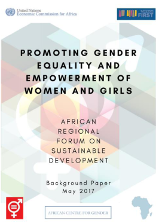Promoting gender equality and the empowerment of women and girls

Introduction
- African economies have grown steadily over the last decades and now rank among the fastest growing economies of the world. This growth, which has taken place in defiance of the uneven global recovery from the 2008 economic and financial downturn, has been celebrated by analysts, who have declared the last decade as a period of triumph for Africa. This achievement is somewhat diminished, however, by the reality that economic growth in Africa has not equally benefited all segments of its population. Inequality has grown in tandem with the continent’s growth. With a Gini coefficient estimated at 44 per cent, the second highest after Latin America,1 and a gender inequality index of 0.572, the highest among all regions,2 income inequality and gender inequality have proved to be the most critical by-products of Africa’s growth.
- Development debates have become increasingly dominated by an investigation of the relationships between growth, inclusiveness, equality, poverty reduction and sustainable development. Research in this area demonstrates that growth in Africa is by no means sufficient to ensure poverty reduction and inclusive and sustainable development. While “the powerful association between economic growth and poverty reduction is one of the central stylized facts of development economics”,3 the evidence on the ground has led to the emergence of a counter-narrative, suggesting that growth can be associated with increased or worsened poverty and vulnerability. The key questions therefore are: first, what are the causal factors behind this trade-off? Second, why have growth and inequality both risen simultaneously, eroding the continent’s poverty reduction and sustainable development efforts?
- The responses, also drawn from evidence on the ground (ECA, 2014, 2015; World Bank, 2011, 2014; UNDP, 2011, 2012; UNFPA, 2016, and other sources) are clear. In the first place, processes generating economic growth but which do not include all segments of the population, women and men, girls and boys, and the outcomes of which do not benefit them equally, failing to take due account of their specific constraints, options, incentives and needs, cannot be either equitable or sustainable. Added to this, unsustainable growth impedes equality and shared prosperity.
- The present paper, a contribution to the African Regional Forum on Sustainable Development, assesses progress in the implementation of Goal 5 of the Sustainable Development Goals, together with that of Goal 17 and aspiration 6 of Agenda 2063. The paper outlines the challenges and opportunities, then spells out key policy messages and policy recommendations designed to ensure that both agendas do not end up as missed opportunities for the continent.